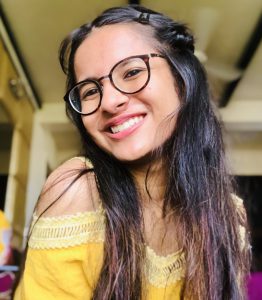Placement students Rishita (CoTEDS) and Mathu (TEDS) give their outlook on what it is like working at the SGDP centre. Their answers range from day- to- day life, tips for the application process as well as its influence on their future career paths.
What does your day-to-day involve?
Rishita: It is tough to describe what a typical day in the office looks like as every day is so different from the other. The best part is that while there are daily CoTEDS tasks to be completed, there is always something new you learn while working. My daily tasks involve sending questionnaires to participants, providing them with email and phone reminders and sending them their rewards after they have completed the questionnaire.
Mathu: I agree, the nice thing about this placement is that you get to view research as a whole, so everyone’s tasks are quite varied. My key tasks have been participant communication as well. The telephone reminders were a bit nerve inducing at first, however it was nice to talk to those involved in the research. My other responsibilities have been admin focussed- however out of all of these I have enjoyed co-ordinating and publishing the EDIT Lab blogs the most. It’s always really interesting to read what the EDIT Lab members have written- whether it’s summarising research findings or giving tips on how to navigate the office- remote hybrid world!
Have you had any key training opportunities made available to you on this placement?
Mathu: This placement allows you to attend weekly seminars from researchers who are prominent in their particular field. These have always been quite thought provoking and have helped stimulate potential areas of research that I would be interested in pursuing. The other great thing is that you can tailor the placement to fit your particular interests. I have been interested in data analysis in particular, and as a part of that have started weekly training sessions on R. I’m incredibly grateful for this opportunity as the sessions have been guided really well and it’s a skill that’s useful in many contexts. There’s not a single session that I haven’t struggled in. Compared to the very beginning however, I have come quite far and that in itself is a reassurance!
Rishita: Learning R has been the most challenging part of my placement. I have invariably thought of myself as jinxed with technology. However, I gave learning a new software a shot. Learning a new coding software is like learning a new language. It takes a lot of time and practice to get it right. I am still not there yet, but I hope to continue learning and understanding different softwares.
What are the key pieces of advice you would give to those interested in applying for this placement?
Rishita: King’s offers a wide variety of placement options to apply to. At first, I was rattled by the number of opportunities and began applying to all that checked the Clinical/Research path. I remember receiving a couple of rejections and being devastated by them, even though they weren’t placements I was interested in. This demotivated me to go through the entire process when it came to the placements that I was interested in. Thus, the most helpful advice I can give is to narrow down your choices to roles that actually interest you and to build your CV and cover letter according to their requirements. Another critical factor is to do background research about the placement. I remember citing a supervisor’s published paper during my interview, which impressed the panel.
Mathu: From screening applications for next year’s placement cohort, I found that the most successful applications tended to meet certain criteria. The first is similar to what Rishita mentioned, really demonstrating that they have researched the placement organisation. With this in mind, things to discuss could be research projects you would like to work on, research conducted by members of the SGDP you found interesting, as well as EDIT Lab blogs that fascinated you. The second thing was tailoring your skill set to fit in with the person specification/ requirements of the job. For example, giving a brief description of a previous job, alongside how the skills gained from that will make you a good fit. The final thing was a genuine interest in working within research – this doesn’t necessarily mean that you can only apply if you are certain that you would like to work within research in the future! However, your enthusiasm (or lack of) can be picked up by whoever is reading your application- mentioning any previous research experience or aspects of it that you think would enjoy can help strengthen what you say.
Has your experience differed based on whether you were a KCL student or not?
Rishita: Three years ago, I moved out of my home in India and reached London to study at King’s. As an international student, KCL has always made me feel at home. I count myself incredibly fortunate to acquire an opportunity to begin my placement: my first job, in my comfort zone. Honestly, there were butterflies in my stomach on the first day of work. Still, everyone in the office welcomed and accommodated us, so I instantly knew I was in the right place and that this placement year would be one of the finest learning experiences I will ever have.
Mathu: No, it did not. I didn’t really know what to expect when I first started this placement. I think one of the hardest things was to enrol as a King’s student being a non-KCL student myself. I was really lucky that Rishita was working in the same office as me, and as a King’s student herself was a bit more familiar with the processes. However, I found it quite easy to integrate into the various project teams I was involved in – everyone was very welcoming! As well as that, I am based in the TEDS office and everyone working there is really lovely. They were all ears whenever I had a particular issue and wanted support. This in itself made me feel settled and helped me remain a positive attitude even through some of the more challenging tasks I had.
We also had monthly meetings with the other placement students at the SGDP alongside the placement student mentors. These were a nice way to catch- up and interact with other placement students and see how they were doing.
What are your future career prospects after having experienced this placement?
Rishita: As a Research Assistant for the Children of Twins Early Developmental Study, my interests are driven towards a career in Developmental psychology. Upon finishing my placement, my immediate priority will be applying for the 1+3 MSc + PhD programme hosted by King’s at the SGDP Centre. I am confident that this is the correct career path for me. I am highly inquisitive in understanding children’s developmental trajectories and how mental health illness can transmit through generations. Likewise, this course will entitle me to collaborate and communicate with like-minded individuals and equip me with the possibility to keep learning, as the scope of research in this field is limitless.
Mathu: One of the most encouraging things was to hear that past placement students had returned to the SGDP centre to complete their Masters/PhD’s. I’m giving myself until the end of this placement to make a more ‘finalised’ decision. At the moment however, I do not see myself pursuing a full-time career within research, even though it is something I have enjoyed in my past experience and certainly within this placement! I miss interacting with various individuals and would feel more engaged with clinical aspects (such as delivering psychological interventions). I am also very interested in anxiety and this placement allowed me to experience clinical aspects of research and build upon my knowledge about this in particular. This does not mean that I therefore felt this placement was invaluable in any way. This placement has helped me in various aspects so far, ranging from dispositional factors such as self-confidence, as well as many other crucial skills including organisation, professionalism, being able to work well in a team as well as independently.




